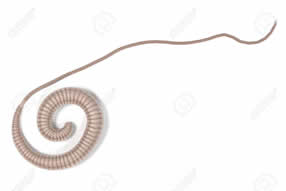Whipworms
Does your dog have whipworms? Dog owners should be aware of what to look out for with respect to this parasite.
Whipworms are not well-known types of parasites, but just like other parasites, they pose a serious danger to our dogs. They reside in your dog's cecum and large intestines just like other parasites and depend on your dog's intestinal walls for food and nutrition. They are also nortoriously difficult to get rid of.
They puncture and even cut the intestional wall and pose an infection danger to your dog. When they mature, females begin to lay eggs which get excreted through your dog's feces. These eggs have a tough external shell and can survive for years in the soil. They do not enter your dog's body through the skin, but only when your dog eats some of them. These eggs show up on toys, water dishes and in the soil. As soon as it gets consumed, they mature and develop within your canine's digestive system. When they become mature worms, they look a lot like hookworms, but they end up in whip-like forms thus giving them the name.
Your veterinarian may not be able to check the presence of whipworm in your dog especially if your dog has diarrhea because their eggs get eliminated through the feces. It may take four visits to the vet to allow him to take samples of your dog's feces before he could positively identify the presence of this worm. Dogs may be able to carry these parasites with no sign or symptom, but after a certain period, they will show the following signs: anemia, vomiting of something yellowish-green in color, having a dull coat, weight loss, and having a loose and bloody stool. On its advanced stage, the intestinal wall becomes punctured causing it to stick to his stomach wall. He will then get irritated by this and will begin to get distressed, frequently licking his right side.
If your vet diagnoses your dog to be with this parasite, he will recommend a dewormer but this could only eliminate the adult ones. So, it may be necessary for you to deworm your dog repeatedly.
To prevent your dog from coming into contact with the eggs of this worm, you may need to put some fresh, new soil and gravel on your lawn and put his quarters in a dry, sunny spot in your house since whipworm eggs could only thrive in moist conditions.
Keeping our dogs clean need not to be only done outside but inside as well. Parasites, such as the whipworm, could reside in your dog's intestines and pose some danger in your dog's health or even be fatal for him, too.




